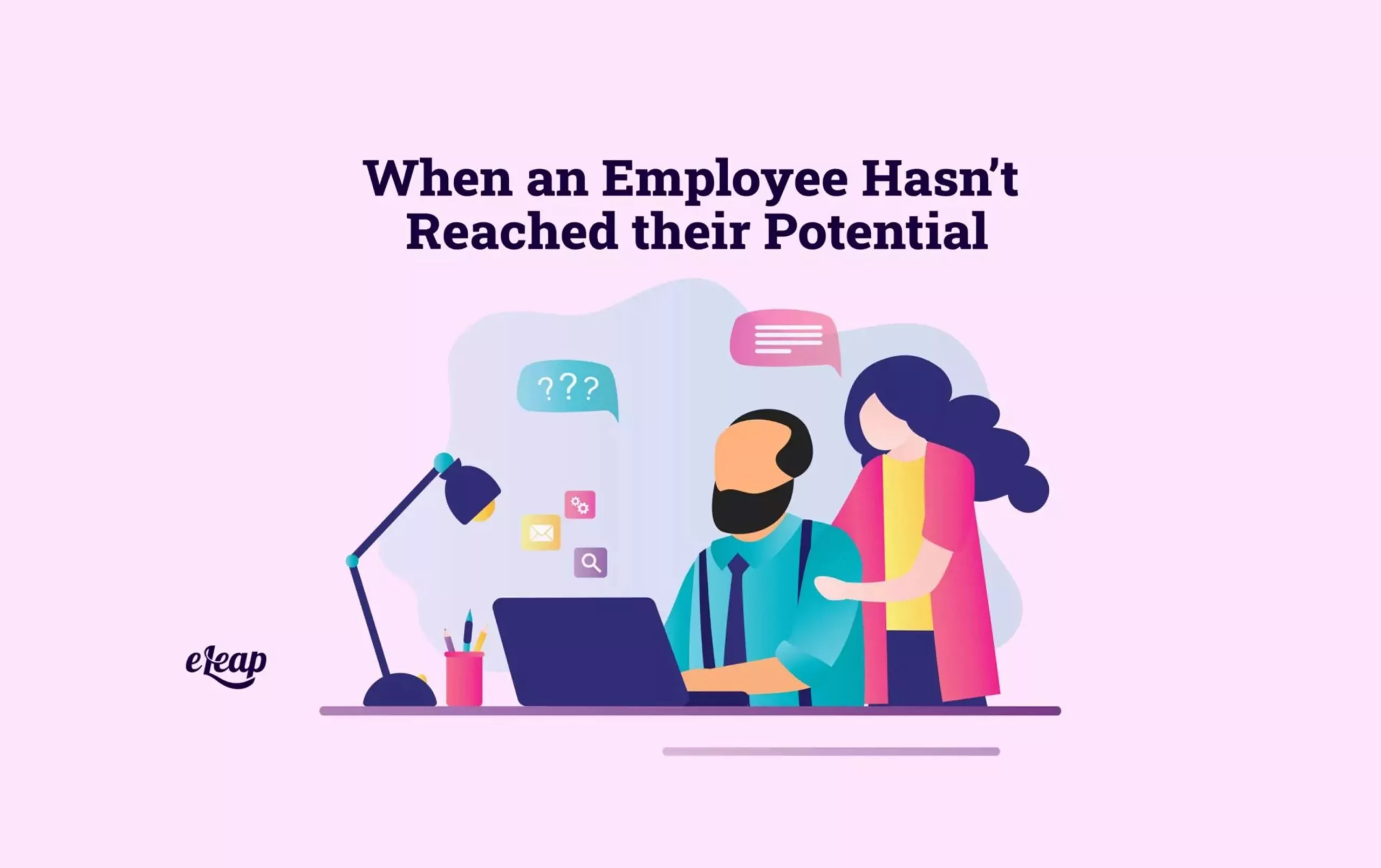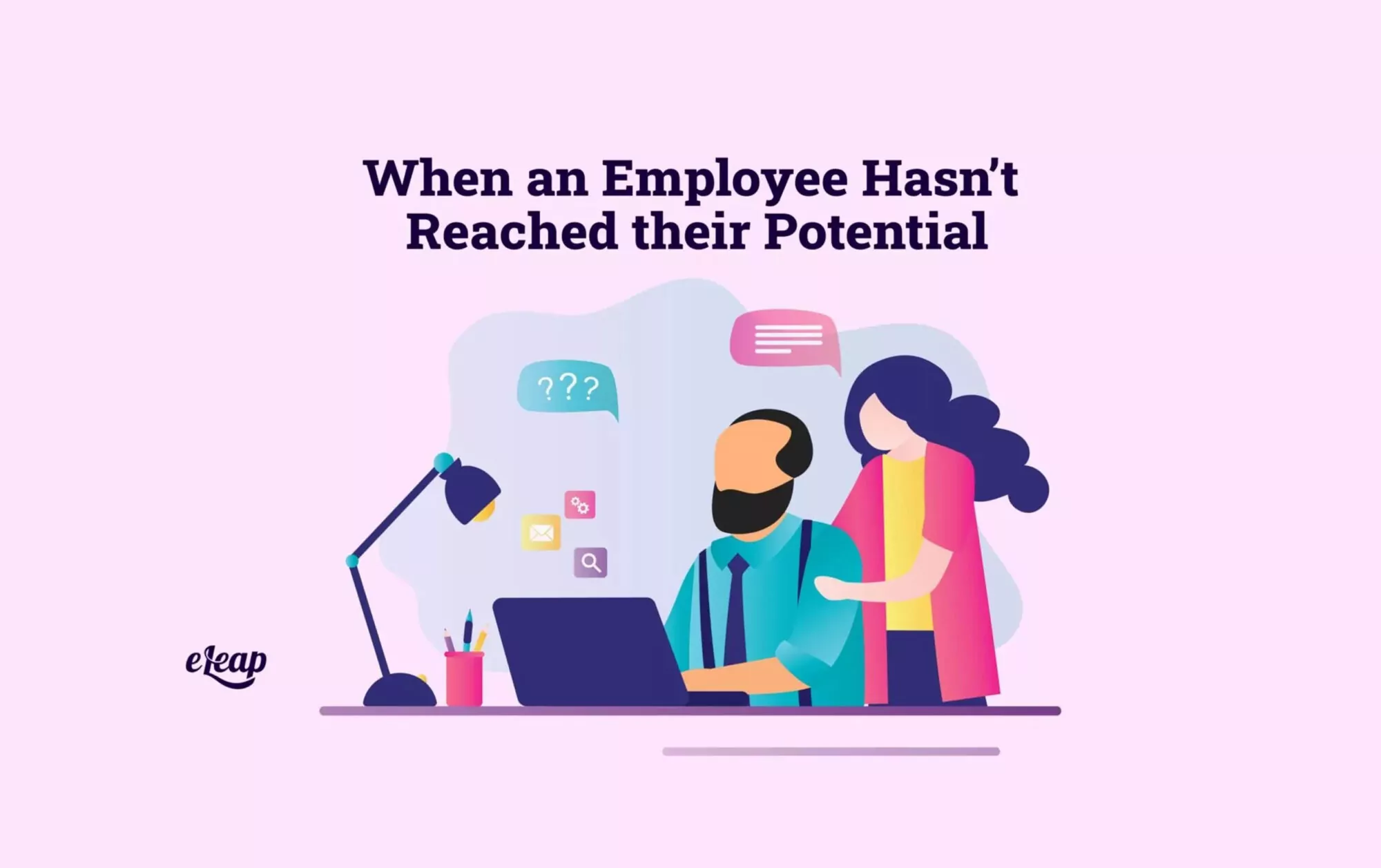When an Employee Hasn’t Reached their Potential

One of the opposing sides of performance management is understanding and dealing with an employee who hasn’t reached their full potential. However, this is one of the primary reasons for adopting such platforms within your organization. Explore how eLeaP®’s Performance Management Platform can simplify evaluations, boost productivity, and drive measurable results.
An efficient PMS platform allows you to pinpoint when an employee isn’t reaching their potential and find the most efficient ways to rectify these situations. The goal isn’t to find employees who aren’t doing their jobs and terminate them; the end goal is to increase retention and work with your current staff to improve production and company culture.

As a leader within an organization, you should never be satisfied with an average performance. The best managers can be judged by how many managers they produce from their mentorship. Good leaders should constantly demand the best out of their team and lead by example.
It’s easy to see when an employee has made significant improvements throughout the year regarding evaluations. However, it can be not easy to gauge when employees haven’t lived up to their true potential. Let’s look at some signs an employee isn’t living up to their expectations.
Goals Aren’t Being Met
This one might seem obvious, but it has to be included, right? One of the most apparent indicators of an employee not living up to their potential is that they’re not hitting their goals.
It’s important to understand the difference between not hitting your goals and underperforming. Your job requirements entail your performance. When you’re fulfilling the duties outlined in your job description, you’re performing at an average level. You’re doing what’s expected of you.
When you aren’t hitting the goals outlined in your job description for each quarter, you’re grossly underperforming. However, it’s always important to look at the specifics surrounding these goals when it comes to employees.
Did they achieve some goals but fall short on specific ones? It’s important to take note of how big they set their goals. If they weren’t achievable in the beginning, this isn’t necessarily a bad thing. It could still mean they are well above par for the course; they’re just a little too overambitious.
You should also examine the team around them. If the team is performing subpar, it might not necessarily be just one single employee that needs to improve.
Are They Stepping Out of Their Comfort Zone?
Stepping out of your comfort zone is important when you’re looking to push yourself as an employee. Sticking to the same inside-the-box thinking gets you average, and most companies don’t want average. They want superstars.
Stepping out of your comfort zone means taking on new challenges and setting goals that might seem far-fetched. It means stepping up to the plate when everyone else is afraid of failing.
The only way to grow as an employee and individual is by stepping out of your comfort zone. This is truly the only way to establish real growth and push yourself past the average.
If you believe an employee has the capacity to do more, it’s your job to bring this up with them. Make sure they understand the conversation is coming from a positive platform and that you just want to see them achieve more for themselves.
They Don’t Share Ideas
Most new onboards will spend the first few months being quiet so they can take in new information. Unless it continues past the six-month mark, there’s nothing wrong with this. At this point, employees should be comfortable engaging peers and providing input by sharing ideas.
The more an employee gets comfortable with their position, the less they should ask questions and the more they should present ideas. It’s also important that employees are being encouraged to provide insight as well.
Sometimes, individuals are introverted, and it isn’t their first nature to speak; sometimes, they feel they’re speaking out of the chain of command and shouldn’t have a voice. It’s important to correct both of these situations and encourage them to get involved.
The longer employees are around the job, the more insight they should have into the organization’s daily activities. If they’re not sharing ideas after being encouraged to do so, this could be a clear sign they’re just not present when it comes to daily activities and the profession of the company.
They’re not Growing as Professionals
Growing professionally is the most important thing an employee can do in regard to their position. This is especially true of younger hires at your organization.
These individuals should have a goal of working their way up the corporate ranks and moving on to bigger and better things. To become the best possible employee, you need to challenge yourself, and this entails growing professionally and moving into higher positions.
This is first done by learning new skills and taking on new tasks and projects. It could also mean stepping up and taking the reins on exciting new assignments within an organization.
We live in an era where there are infinite ways to acquire new skills and information regarding your job. It’s crucial to ensure employees are given reading lists, access to webinars, and other things they can learn from. This is your job as a manager to ensure they’re getting the tools they need to grow professionally.
An employee who isn’t growing professionally is a huge red flag that they’re not enjoying their job. Normally, this would be a surefire way to guarantee employee and employer parting ways, but when discussing goals in performance reviews, these situations can be rectified and worked around.
This is the beauty of modern-day PMS platforms. In the days of old, negative reviews meant knowing who to give the axe to.
However, the LMS platforms used presently are much different and have infinite ways of providing valuable insight. Nowadays, employee retention can be increased, and jobs can be salvaged due to data and understanding how to manage employees better.